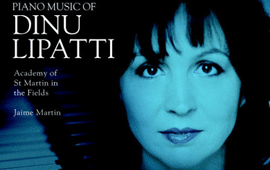> [Archived] Interviews

A New CD with Dinu Lipatti's Music - an Interview with the Pianist Luiza Borac
A year ago, in 2011 you played Lipatti on the stage of the Enescu Festivaltogether with the Academy of St. Martin in the Fields and with the conductor Jaime Martin. Was this the starting point of your recent CD?
This concert was without doubt a special and beautiful event, especially due to the collaboration with the Academy of St. Martin in the Fields, an orchestra that has reached the highest levels of artistic excellence and has become a traditional orchestra which is famous all around the world. I have come close to Dinu Lipatti's compositions by studying the works of our other great giant, George Enescu, and after I recorded Enescu's piano works, I strengthened this bond with Enescu's compositions with my doctoral studies, under the guidance of Professor Grigore Constantinescu. Due to these studies I have rediscovered Dinu Lipatti, especially his compositional part. Dinu Lipatti is both George Enescu's godson and the ideal performer of his works and interpreter of worldwide first auditions of George Enescu's musical pieces. So, it was through George Enescu's creation that I got closer to the great Dinu Lipatti.
The Lipatti CD includes some first audition pieces and musical arrangements unknown to the audience. How did you discover these scores?
First of all, I'll begin by telling you that the one who comes closer to the great composer Dinu Lipatti is impressed by the wide spectre of these compositions; we have wonderful musical arrangementsafter Johann Sebastian Bach's music and also an adaptation, a recreation of Navarra' work by Isaac Albeniz, a work which Albeniz started and Lipatti rethought and, rewrote and we also have the original musical piano pieces, with romantic influences, influences from French music but also powerful influences from Romanian folklore. I want to thank my beloved Professor, Lavinia Coman, who guided me through this project, the Excellency Centre of the Bucharest Music Academy and my whole gratitude goes to Professor Grigore Bărgăuanu, the one who helped and guided me through the study of Dinu Lipatti's scores.
Translated by Andreea Mesescu and Elena Daniela Radu
MTTLC, Bucharest University














